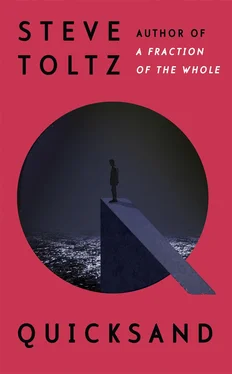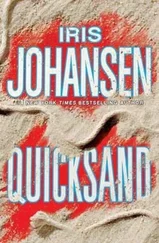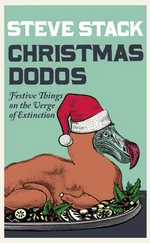— It really is a pleasure to see you, Aldo. I’m sorry things aren’t working out for you.
— And I’m sorry your dreams remain unachieved after all these years.
We were like two dehydrated hikers who had bumped into each other on a deserted trail. Neither had water.
And I object to your objection! This does in fact relate to Mimi Underwood, Mr Crown Prosecutor, because some memories sit like puddles and refuse to evaporate. It was at that moment it hit me; I excused myself and ran to the boys’ toilets on the third floor where in the fifth stall, carved into the wall with a penknife, faded by time but still perfectly legible, were the same words that I had seen more than twenty years earlier: Mimi. Underwood. Sucks. Teachers. Cocks.
I knew I had seen her name before! The Mimi the teachers spoke of was of course the deceased, the same woman I had helped four months earlier remove pornographic posters put up by a man who, I submit, ladies and gentlemen of the jury, set out to slander and humiliate Mimi Underwood and later murdered her . Maybe. That’s one possibility. We don’t want to rule it out.
Mr Morrell was still in the quadrangle, and I had to shout over wailing ambulance sirens and the deafening roar of a plane passing overhead.
— Do you remember a Mimi Underwood?!
— Why? What have you heard?!
Someone yelled out, Morrell sux! He laughed without turning around, and I remembered how he always acted like he’d put your hatred in his desk for safekeeping.
V
— As you might remember, Aldo, Morrell said, once the plane had passed, it was the great pleasure of my teaching life, a pointless joy perhaps — like the love of telling librarians to be quiet — to discover poets, musicians and painters among all those budding physicists, dreaded footballers and drug-dependent over-sharing sex-addicted shopaholic knife-wielding porn-aficionados. Basically, I preferred creative souls who had a burning gift to offer the world and who knew how to degrade me with panache.
— What’s this got to do with Mimi Underwood?
— She’s a photographer. She illustrated a children’s book.
— With photos?
— Black and white photos. The book was called The Fussy Corpse . It seemed too adult and cerebral for children but what do I know? I’m just a teacher. The evening after reading it I wrote her a letter, care of her publishers: ‘Dear Mimi Underwood,’ it said, ‘students often see teachers as peripheral to their education, but I wonder if you’d stoop to remember me anyway: Angus (“Mr”) Morrell. It’s with great pleasure that I,’ et cetera, et cetera. In short, I congratulated her on her meritorious achievement, and wondered if it was not too forward to ask for a signed copy of her magnum opus. Only after I sent the letter did I realise I had forgotten that a newly published success must be inundated with appeals for friendships and merchandise, and when a month passed without response, I wrote a second letter apologising for the first, and to lighten the situation I asked if she remembered our last encounter, when I spotted her outside Pitt Street Mall selling umbrellas in the rain.
— Who was selling umbrellas in the rain? Mimi?
– ‘It is a reliably awkward displeasure to unexpectedly run into students in the outside world,’ I wrote in my second letter, ‘but there was something especially depressing about the sight of you drenched to the bone with cheap black umbrellas hanging off your arm. I had feared that you were mistreating yourself into an early grave, though you certainly wouldn’t have been the first highly gifted student to make a garbage dump of your life. ‘How long has it been?’ you asked me in a voice that sounded hoarse from singing. Normally it is the student who knows how long since she left school, and not the teacher, and I said as much, adding that time moves so fast there are not even discernible epochs anymore, and I knew people five generations apart with only twenty years between them.’
I stood speechless, frozen by the strange manner of repeating his own letter verbatim like some arcane party trick, and I was reminded what a weird and amusing and eccentric man he was. Morrell went on:
– ‘I remember you remembering me,’ I wrote Mimi, ‘and you laughed, but then your face became a disquieting mask of what I took to be the deepest unhappiness, and after an awkward goodbye I remember smiling as I walked away, because in truth it is often a more sincere pleasure to see a depressed former student than a happy one, because in the happy ones I can see the disheartening process by which they became happy: high ambition, repeated failure, discouragement, eventual giving up, settling for less, reluctant acceptance, and finally contentment with the little things, somewhat beautiful in the individual, but depressing when it occurs by the thousands year after predictable year.’
— Did she write back?
Morrell shook his head sadly. He looked totally depressed.
— Oh well, one gets used to ingratitude, he added, and as he walked away, I thought: That’s perfectly right, one does.
VI
The salesgirl at the third bookstore I tried suggested the local branch of the public library. I know what you’re thinking, bailiffs: What is this, 1996? I raced through the streets as if through a time tunnel, to the bland underwhelming brick building behind the train station. My heart sank when I came across an island desk with twenty computer terminals, leather couches and espresso machines, but upon asking, the librarian directed me to the appropriate shelf. It was there, The Fussy Corpse , written by Elliot Grass, illustrations by Mimi Underwood. I took it to a leather couch beside loud-whispering students.
The striking, eerie cover featured a charcoal sketch of two burning eyes peering out from a crack in a coffin lid, yet inside, as Morrell had indicated, instead of the expected drawings, the accompanying illustrations were stark black and white photographs that I browsed without understanding their context — haunting photos of an empty field, an elegant fir tree veiled in mist, a vermilion sunset, vines tangled around an oak box, dazed eyes smeared with mascara, a plume of smoke over a small hill, an ornamental jar on a stone-tile floor, a white shroud, two bodies facedown in the snow, a pair of bagpipes, a brick chimney, a sturdy pile of rocks, and an empty child-sized suit laid out on a bed. I would like to submit The Fussy Corpse into evidence as exhibit B.
This is how it begins: Four exhausted and irritated pallbearers were carrying a fussy corpse across half a dozen cemeteries when their arms got tired.
Understood. If we’re time-sensitive, Your Honour, in summary, the book tells the story of a recently dead boy who doesn’t want to be buried ‘just anywhere’, and the four pallbearers who carry this disenchanted corpse to every continent, into teeming cities and small towns, into rural and urban communities, into remote tribes and off-the-wall cults, where he is offered every type of funeral that is conducted in human civilisation, but nothing appeals. He does not want camphor placed in his orifices and armpits while loved ones wail and scratch their faces and wear their clothes inside out; he does not wish to be mummified or to be buried with soldiers or under a tree or in his own garden or in a low-ceilinged cave cut into stone or in an unmarked grave or along with his belongings or with family members or with a sacrificed ox or with his knees drawn up to his chest or in a sand dune or with a corpse-bride. Nor does he want his body covered with rocks nor to be placed in a three-humped rectangle-shaped casket nor on a bed of sweet-smelling spices, and he does not wish to be dusted with talcum powder or dressed in a suit or placed on a mat or covered with yellow cloth, and he has no interest in hearing chanted verses of scripture or bagpipes or love songs, and he is not inclined to have his internal organs removed and the body cavity filled with salt, and he does not wish a rope to be wrapped around his legs and neck and pulled tight to make him into a ball; nor does he want to be dumped at sea nor shot into space nor cremated and his ashes placed in a mausoleum or on someone’s mantel or immersed in running water or scattered in a rose garden, and he has little interest in facing the setting sun or Mecca or Mount Kailash, and he does not want to be embalmed or tied to a stake on a hilltop and eaten by animals or vultures or carried on bamboo poles or placed on a pyre of sandalwood, and he especially does not want those flames aroused by clarified butter or to have his skull broken with a long pole or for his body to be covered in flowers or uncut hair or steel bangles or a short sword, and he does not want to be swathed in a white cotton sheet or placed in an unlined coffin or in a simple pine coffin with holes drilled in the bottom or in a purified room with or without an untasselled prayer shawl —
Читать дальше











